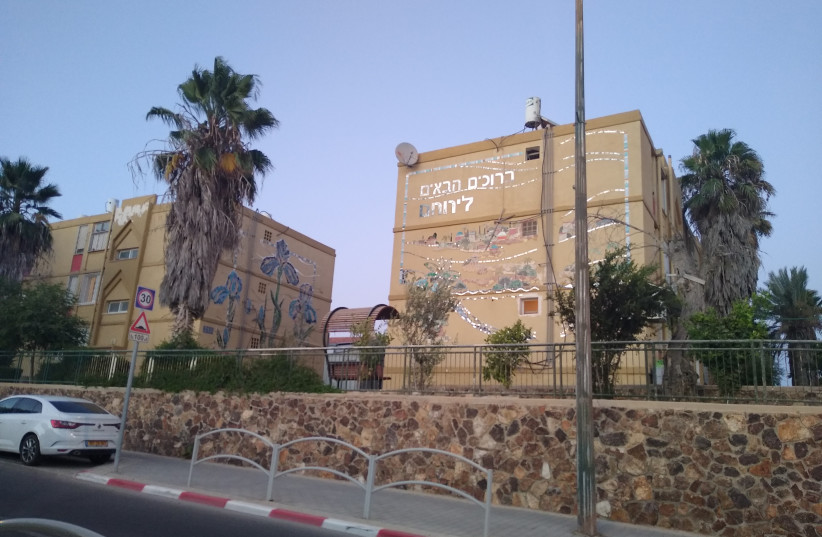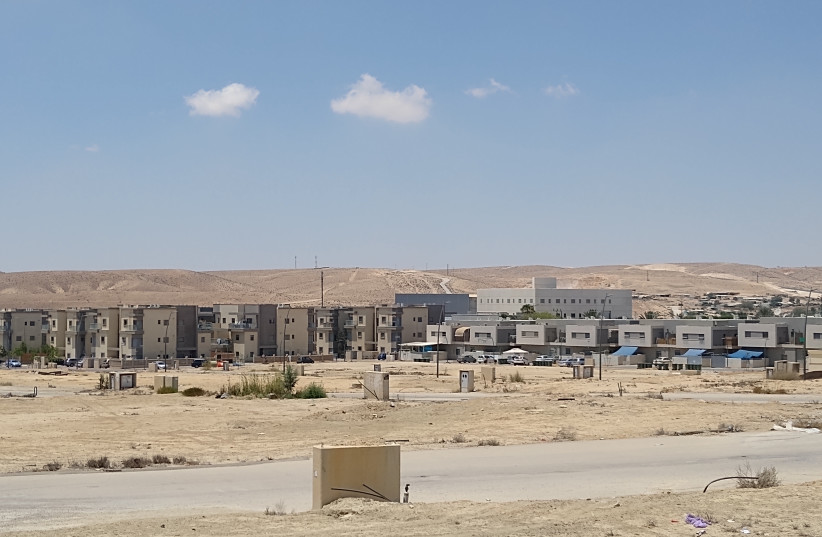As I hurriedly walk to my daughter’s doctor appointment at the medical center on the main street of Yeroham, I pass by the local municipality. A petite woman dressed in a formal pantsuit leaves the building and greets me with a friendly shalom as she continues along her way, greeting other locals. It is Tal Ohana, the mayor of Yeroham.
A few days later we meet at Yeroham’s Desert Iris Hotel for an interview for the Magazine. Dressed in regular blue jeans and a T-shirt, Ohana is down to earth and friendly, taking a moment to say hello to the hotel’s employees before we sit down.
Tal Ohana, 37, is in her third year serving as the mayor of Yeroham. She was one of 13 women who were elected during the municipal elections among 251 local authorities in 2018 including Aliza Bloch of Beit Shemesh and Dr. Einat Kalisch Rotem of Haifa. She was also the first woman to hold the position of mayor in the history of Yeroham.
It seemed like Ohana would face the typical agenda for a mayor located in the periphery of Israel – economic and social development issues, locating philanthropists and foundations to support city-wide projects, and strengthening educational and cultural platforms. Ohana knew these issues well, having served as deputy and acting mayor for eight years previously under former mayor Michael Biton, today a Blue and White MK.
But two years into the position, Ohana suddenly found herself in uncharted territory when the corona pandemic broke out last year.
“Within a night, the reality in Yeroham changed. We found ourselves facing a life and death situation,” described Ohana, who herself is a fourth-generation native of Yeroham.
Yeroham, a development town of roughly 11,000 people, was listed red, back in mid-September 2020, when 100 residents were infected with the coronavirus. Within two weeks, Ohana was able to take measures that cut the cases down in half to 44 and prevented the virus from spreading across the city. By the end of September, the city was once again green, an accomplishment that did not go unnoticed by many cities and municipalities across the country unable to cut the infection rate.
“We decided not to wait around for the government to instruct us what to do,” she says.
For example, last September, Ohana had closed down the town’s largest high school when three teenagers from the same class tested positive for COVID-19. Under the Health Ministry regulations, only the class had to go into isolation but Ohana did not want to take chances. In addition, she set up the city’s virus contact-tracing system facilitated by a network of volunteers, and utilized Facebook and other social media platforms to raise awareness and update citizens. She also ensured that the prayers for the High Holy Days took place outside the synagogues, borrowing shade canopies from army bases to provide prayer-goers with protection from the hot Negev sun.
Closing down the town’s synagogues two weeks before they were shut down nationwide was no simple feat. Around 70% of the city’s population is religious or traditional.
“I could only close down our town’s synagogues thanks to the amazing cooperation of Yeroham’s Chief Rabbi Yitzhak Shalev and other local rabbis who understood the danger of the virus spreading in closed areas,” said Ohana who is Shabbat-observant.
“I felt that every decision I made could decide whether people would survive or not survive this pandemic. I think as women, we take responsibility for life. No one told me what to do. It was instinct. My state of mind was to preserve life,” she explained.
She took the same approach during the recent 11-day war with Gazan terror groups in May. While rockets targeted nearby Dimona and Beersheba, Yeroham was not fired upon. However, Iron Dome interceptions were still observed in Yeroham. “I couldn’t sleep at night because I was worried that something might happen,” said Ohana. “On the second night [of the war], Iron Dome interceptions could actually be seen from the night sky, and I decided that schools had to be closed here the next day.”
Ohana was not going to take even the slightest chance that a rocket might hit a school on her watch. “I was not afraid to take action even though I was expected to wait for the Education Ministry to issue instructions first.”
In addition, the breakdown in Arab-Jewish relations in mixed cities across the country during the war did not skip over the Negev desert region of Israel, where some Bedouin attacked passing cars and police stations. Because of the situation, Ohana believed that it was vital to highlight the solidarity shared between Yeroham residents and the neighboring Bedouin village of Rahma.
In a Facebook post, Ohana shared a video of herself, Chief Rabbi Shalev and Sheikh Odeh Zanun of Rahma sitting together in her office, where they quelled any notions of friction and spoke about the years of friendship between the two communities.
“The coronavirus pandemic made me a much more assertive leader in all areas,” commented Ohana.
Ohana’s experience with leadership started off at a young age, getting involved with youth movements and student council and serving in the IDF in a number of command positions at the Hashomer Farm, a base that runs special educational programs for soldiers from broken homes.
She later studied at the Max Stern Academic College of the Jezreel Valley and completed her BA in organizational sociology and a master’s degree from the Lauder School of Government, Diplomacy and Strategy at IDC Herzliya.
“I went through all the right junctions on the way to becoming mayor,” she explains. “But the fact is that it was never my dream growing up to be mayor. I always thought I would become a businesswoman and own a business like my father.”
And yet when former Yeroham mayor Michal Biton asked her to become his deputy mayor at age 26, she couldn’t believe it. “I didn’t understand what he saw in me. But he believed in my potential and told me that I had a lot to give back to this community.”

One of Ohana’s principal goals in giving back to her community as mayor is to provide quality employment for Yeroham’s residents. “A lot of effort is put into creating quality jobs here. It’s not easy here in the periphery. We are doing everything we can to make Yeroham an economically attractive place to invest. There are days where we succeed,” she told the Magazine.
Indeed, Israel’s first cannabis ecosystem, CaNegev, was launched in Yeroham in June, as a joint effort between Perrigo, OurCrowd and BOL Pharma. The cannabis innovation hub offers two main programs for entrepreneurs including financial support for start-ups and novice entrepreneurs. Yeroham has also received state approval to build two cannabis factories in the coming year.
Ohana also worked with other partners to create a center for female entrepreneurs in Yeroham called SHE WORK, where local women learn and develop skills, like networking and digital marketing for their businesses, in a supportive environment. “Especially during the pandemic, many women working in the cosmetic industry, for example, owners of hair and nail salons, were hit hard,” explains Ohana. “These women struggled financially and SHE WORK was able to assist in providing creative solutions for their business challenges.”
But Ohana won’t stop with just business solutions for women. One of her next projects is to open a medical clinic for women in Yeroham. “We are working to establish a medical clinic that will provide services for women that you can’t find in Yeroham right now,” she said.
In addition, she and her team are also working to encourage young people in the town to study engineering through the opening of a new program. “I see engineering and biotechnology as a significant part of the economic future of our town,” she said.

As much as Ohana is always looking ahead for ways to develop her hometown, she never forgets her past. Her great-grandparents made aliyah from the southern region of Morocco in the early 1960s and Morocco is never far from her thoughts. At the age of 24 after her army service, she visited Morocco for the first time and went to the villages her parents’ families came from. “I’ve been to Morocco 35 times since the age of 24. During the first visit, I met young Moroccan Jews who were studying at universities in the USA and France,” she said. “My first question to them was why they weren’t studying in Israel?
“They replied to me in English: Israel is a land of wars. After that conversation, I established a movement for Zionist activities in Morocco that encouraged young Jews to make aliyah to Israel. There were 100 Moroccan Jews who made aliyah to Israel thanks to our work.”
Her aliyah work also continues as mayor of Yeroham. Last year, she and her team worked on an aliyah project with the aim of encouraging 100 American families to move to Yeroham from across the US. “We organized ‘Meet the Mayor’ Zoom meetings and almost every evening I spent time speaking with interested American Jews. I was surprised to find out that some had even heard of Yeroham.”
According to Ohana, 15 American families immigrated to Yeroham. “Immigrants have always contributed significantly to this community,” she said.
Indeed, the first immigrants to Yeroham when it was initially established as a transit camp in 1951, came from Romania, followed by new olim from Morocco, India, and later, Russia.
OHANA’S RESPECT for the past can also be seen in her sparsely decorated office. There are no diplomas, certificates or awards hanging on the walls. Instead, there hangs a lone photo of four laughing grandmothers sitting on a bench in a Yeroham park. “This photo is what inspires me,” she explains. “It doesn’t matter what I’m doing or what I have accomplished, that photo reminds me of what I want to be – a good, kind woman, eshet chessed, like my grandmothers.”
She feels a particularly strong connection to her grandmother, Rachel, who passed away right before she was born. Rachel volunteered in the Chevra Kadisha (burial society) of Yeroham, caring for the deceased and preparing them for burial. She also raised four grandchildren on her own when the parents were unable to do so.
“With the little they had, my grandparents did their best for the next generation. While they didn’t know how to read and write in Hebrew, they had the wisdom to value a good education and fought for the best education possible for their children,” said the mayor.
She mentions her grandmother Zohara, who made sure that her children all went to high school outside of Yeroham as there was no high school at the time in the city. Ohana’s father studied at the High School for Environmental Studies in Midreshet Ben-Gurion. “He would wait at the pathways to see if he could catch a glimpse of David Ben-Gurion,” she recalled.
“If you would have asked my great-grandparents when they first got here in the early 1960s, if they could imagine that they would have a great-grandchild who would be mayor, I’m not sure that they would have known how to answer,” said Ohana, who is single. “But what I do know is that who I am today, is thanks to them.”
The writer made aliyah from Maine in 2004. She lives with her family in Yeroham and works as an English-language teacher in Midreshet Ben-Gurion.
